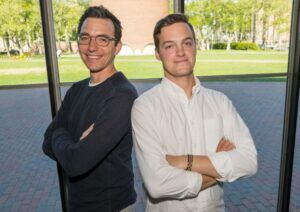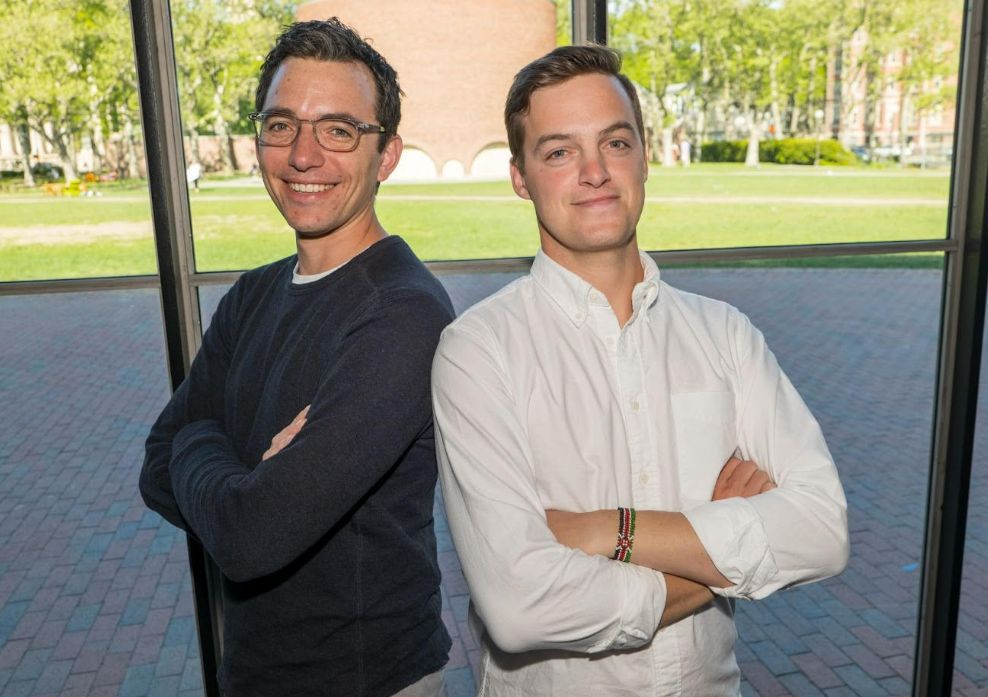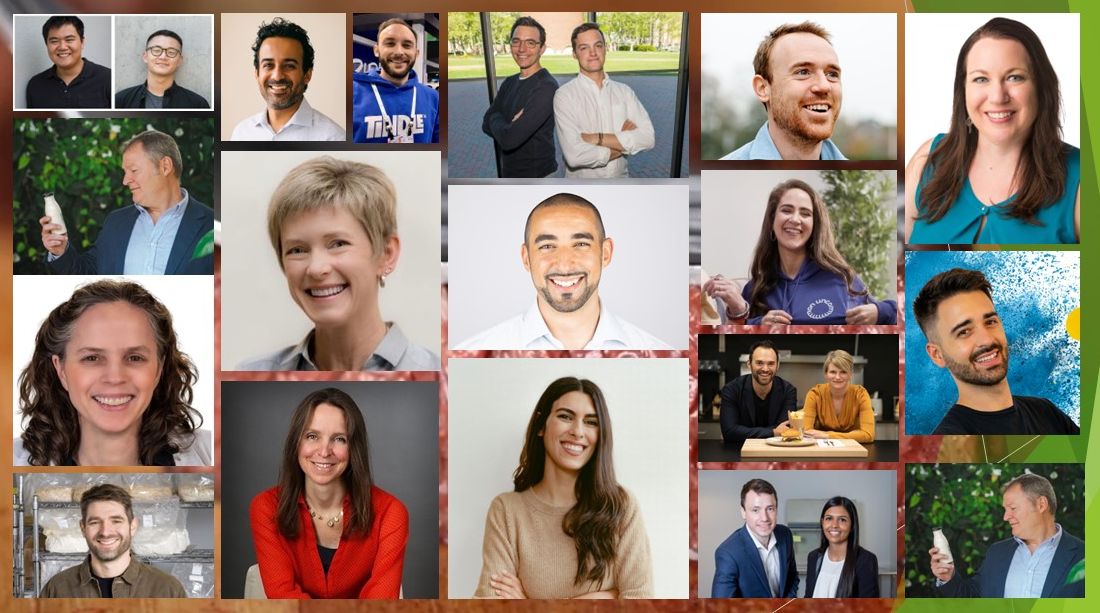What tech innovations are agrifoodtech startups most excited about as we head into 2024? To find out, foodtech editor Elaine Watson fired off a few emails to companies she’s covered on AgFunderNews this year (apologies if you weren’t contacted, next year this will be more systematic 😉).
Unsurprisingly, AI was top of mind for many founders, but it’s not the only thing on their list…
Timothy Wannier, cofounder, Wild Microbes: I’m excited about DNA synthesis… how cheap will we get it? I’m also excited about electrochemical conversion of carbon dioxide into more energy-dense matter, and the opportunities that this creates for green energy to feed into new materials.
Todd Beckman, CEO, Verb Biotics: Using modeling and AI is an area that will really propel our industry forward. The ability to model the addition of different probiotics into diverse systems like the gut microbiome can provide insight into how the probiotic will function in the gut, how it survives and performs with other microbes in the environment and how it can impact the person taking it. Since the function of ‘omics’ is dependent on the metabolites they are generating, modeling the production and usage of those metabolites is key to understanding how to effectively use these new products.
Benjamina Bollag, founder and CEO, Uncommon: I’m most excited about RNA technologies that are dramatically reducing the barriers to scalable, affordable and sustainable cultivated meat momentum from companies addressing the cost of manufacturing RNA to better and faster design.
Shannon Hall, cofounder and CEO, Pow.Bio: What we are excited about in general is that the world’s leading governments are putting real incentives in place to accelerate success for bio-based and renewable products. As for technologies, we love building high data density around biomanufacturing, so anything that facilitates better, richer data has got our attention: soft sensors, digital modeling and process control and of course, technologies that modernize bio-based manufacturing. We noticed that a number of sessions at [industry events such as] SIMB, RAFT and other technical conferences highlighted the significant progress in these areas.

Mohammed Ashour, cofounder and chairman, Aspire: I am most excited to see meaningful applications of AI in indoor controlled agricultural environments. At Aspire, we will collect tens of millions of data points data from thousands of IoT sensors throughout our growing environment and anticipate leveraging machine learning to support a self-correcting, self-adapting growth environment for optimal yields.
Ido Savir, CEO, SuperMeat: I’m really excited about using advanced data analytics and AI to improve our cell-based meat production’s cost efficiency. After collecting detailed data for six years and with the AI developments in 2023, we’ve been able to take our data analysis to a whole new level. This approach has led to a big success recently: we’ve managed to lower our media costs to less than $1 at scale. This shows how much technology can improve how we operate and set new standards in food production, especially in making everything more traceable and efficient.
Dr. Nathan Pumplin, CEO, Norfolk Healthy Produce: I am most excited to see new premium fresh fruits and vegetables, powered with biotechnology, break into the mainstream. I’m looking to the expansion of Pinkglow Pineapple, and the retail launches of Conscious Greens and the first Norfolk Healthy Produce Purple Tomato. If these products can be established as winners in the market, it opens opportunities for biotechnology to play a bigger role in improving sustainability and human health.
Andy Kleitsch, cofounder and CEO Atomo Coffee: We are excited about Generative AI technology and the speed we believe this will bring to discovering new products and solutions within the food & ag industry. Not only does it bolster the capability for young companies to get more done with fewer resources, the application of this technology for formulation has the ability to reduce time to market for new products.

Frank Jaksch, CEO, Ayana Bio: Plant-based meat’s tailspin decline has some lessons for CPGs in 2024: consumers want ‘plant-based’ products to actually contain healthy plants. Next year, I’m excited to see more companies shift away from trendy precision fermentation and synthetic ingredients that are ‘nature identical’ in favor of real plant-derived ingredients that still have a high-tech twist, which can be achieved through plant cell cultivation for example.
David McElroy, CEO, Green Bioactives: I am excited by plant cell culture technology as an alternative to the way natural ingredients are sourced. This may seem biased as I work for Green Bioactives, but it is this technology and its ability to revolutionize the natural ingredients space that drew me to the company a year ago. Plant cell culture has the ability to bring plant-derived products to the market which are natural and more economical, reliable and sustainable than traditional extract methods.
Mariah Scott, CEO, Rantizo: I’m excited about the rapid advancement of all types of crop robotics—from just better drone battery life and tank capacity to new VTOL spray drones, and in-field robots for almond harvesting. These robots will help us be more productive and safer.
Timothée Boitouzet, founder and CEO, Woodoo: I’m very excited about blockchain for wood traceability, new bio-based resins, the huge trend towards modular construction, as well as bioengineered plants and improved photosynthesis that would help trees grow 30-50% faster.
Jim Fader, cofounder and CEO, Eden Brew: I am very interested to see continuous fermentation develop at a larger scale and across different production hosts. We need to work together to innovate and unlock pathways to price parity with commodities in the food supply chain.
Naveen Sikka, cofounder and CEO, Terviva: Everything ‘bio’ seems to be back – second gen biofuel, biocoal, biochar, biobased crop protection derived from nature – driven by corporates that are looking to decarbonize or service customers with lower carbon intensity products. Farmers worldwide can grow the inputs needed for these ‘bio’ products. We’re closely tracking these markets – we have seen them before move up and then back down, but this time seems different.

Alan Hahn, cofounder, MycoTechnology: I am most excited about the advancements in precision fermentation, which will allow new, valuable discoveries from nature to be economically scaled and commercialized. For example, this technology will allow us to produce a newly discovered sweet protein from fungi, Honey Truffle Sweetener, which we are confident will be a game-changer for sugar reduction.
Aaron Feigelman, founder and CEO, The Kawa Project: I’m most excited about fermentation technologies related to flavors and novel fats. There’s quite a lot of R&D happening in this space, and I’m keen to see which projects end up scaling over the next five years with favorable unit economics.
Luke Young, cofounder and CEO, ALORA: I would be foolish to not give a nod to the public adoption of AI, this can unfathomably change the speed at which obstacles are overcome. It’s incredible, but it is fundamentally a tool at this point. What we can achieve with this tool will dwarf the advent of public AI, e.g. crop climate adaptions, iterative full-spec designs on seeds that grow shelters, ecosystem engineering, or household personalized agriculture all complete in the glimpse of an eye.
Bryan Tracy, founder and CEO, Superbrewed Food: Biomass food ingredients have been in the market for over 30 years, but new and better versions are coming in 2024. We’ll see the introduction of biomass ingredients into markets beyond alt-meat, such as dairy and alt-dairy, and the technical potential will be significantly expanded in 2024. I also expect to see ground breaking on new capacity for biomass ingredients in 2024.

Maria Cho, CEO, Triplebar: Particularly in alternative protein and cultivated meat, the technologies that will be very synergistic with our hyper-throughput screening platform are those that enable rapid and predictable scale-up from bench scale to large scale fermentation; technologies that enable rapid bench-scale testing of hundreds of strains; trickle-down of better AI algorithms from language and image work that we can train using our data to make better organisms and drugs; as well as a factory that can produce cultivated meat at scale with known process parameters for us to target.
Amos Golan, founder and CEO, Chunk Foods: I’m very excited about solid-state fermentation (SSF) and the potential it holds in creating better-tasting products at scale, despite having been around for centuries, as well as seeing innovation around hybrid products and new product form factors. SSF has the potential to take plants, which are great sources of protein and fiber, and improve their texture, flavor, and nutritional profile to obtain better, testier, and healthier plant-based options.
Dr. Hermann Tribukait, cofounder and CEO, Atinary Technologies: We are most excited about the benefits our clients are seeing from integrating our machine learning platform, SDLabs, with robotics in their R&D labs to accelerate molecule optimization and discovery exponentially. In food and ag tech, these solutions open up opportunities to develop new and healthier formulations for products, as well as reduce energy intensity in chemical reactions with new catalysts and discover better materials that are more recyclable and sustainable, such as new materials for food packaging.
Hermes Sanctorum, cofounder and CEO, Paleo: It shouldn’t come as a surprise that in the world of alternative proteins, I see the most upside to precision-fermentation. Whereas now it has become a state-of-the-art food technology, fermentation has been practiced by mankind for centuries, long before laboratories existed. We don’t need to start from scratch, it’s a technology that already exists and is easily scalable.
Mark Warner, founder and CEO, Liberation Labs: I am excited about how microbial fermentation technologies are finally maturing into fully developed processes (fermentation through downstream processing) that are fit for commercial scale manufacturing. It has been many years in the making, but the next generation of products we have been waiting for are reaching performance (price and quality) required for commercial viability.
Dave Brown, COO, Chinova Bioworks: We continue to work towards technologies that address the terrifying amount of food wasted by humankind. We’re excited that new natural and healthy ingredients are being developed that will extend the shelf life of foods and beverages, while new processing techniques will protect produce.
Magi Richani, cofounder and CEO, Nobell Foods: I’m excited by the advances we’re seeing in biology and plant genetics that allow us to feed the world in a more sustainable way. For the first time, we’re seeing farmers and agriculture as part of the climate conversation and that is essential to finding solutions that will positively impact and save our planet.The integration of machine learning in research and development is another exciting frontier, enhancing our comprehension of biological relationships and expediting the innovation process. As we collect massive amounts of data, having algorithms that can predict with better accuracy how certain biological relationships work is very powerful and can shorten R&D cycles.

Krijn de Nood, cofounder and CEO, Meatable: We are confident with our unique method, one that sets us apart from other cultivated meat companies. By isolating a single animal cell and replicating its natural growth process using our opti-ox technology, in combination with pluripotent stem cells (PSCs), we are currently able to produce real muscle and fat cells that are fully differentiated in only eight days. Furthermore, any developments that lead to further optimization of a sustainable, scalable, and cost-effective supply chain for growth media in the cellular agricultural space, will have a significant impact on the wider industry.
Michael Fox, cofounder and CEO, Fable Food Co: I’m excited about the alternate protein industry moving away from marketing food technology to consumers and the exciting innovations that will enable more delicious, well priced, natural, whole food alternatives to hit the market.
John Ireland, founder and CEO, NTP Technologies: At NTP we are strong proponents of regenerative agriculture and precision ag. Our mission is to reduce the amount of synthetic fertilizer necessary to grow the crops needed to sustain the population. Regenerative Ag allows us to use the tools mother nature provided to optimize plant health and growth. Precision Ag provides us with tools to assist mother nature in very specific ways such as pest and wed control or nutrient applications.
Adam Yee, cofounder and CTO, SOBO Foods: There are still nascent and cool technologies out there in the B2B space that say they have these awesome technologies but don’t really take the time and care to share it with startups and instead put all of their resources going after gigantic companies where it takes ages to make a sale. I’m fortunate to have used some underrated and innovative technologies in our dumplings but I had to pull a lot of strings to get them. It takes time for these ingredients to get pushed to more broader appeal, but for us as a startup, it’s great to test them out and see people’s reactions. These range from taste maskers to precision fermentation, to even better-bred soybeans.
Andre Menezes, cofounder and CEO, Next Gen Foods (TiNDLE): I’m excited to see how relevant and innovative technologies are being repurposed to feed a wider set of applications. For example, we’ve made new developments with extrusion technology – and this combined with culinary expertise and inputs – can only elevate the consumer experience of dining on plant-based meats.
Joshua March, cofounder and CEO, SCiFi Foods: There are a number of B2B food tech companies that are pushing forward technology and product quality across a variety of vectors, including Shiru (novel ingredient discovery), Triplebar (application of microfluidics to cell line development), Savor and Zero Acre (different approaches for novel fats), and Ark Biotech (cheaper bioreactors for cultivated meat). Transforming the food industry requires more than just one company, and it’s awesome to see the innovation happening across the landscape.
Somsubhra Gan Choudhuri, cofounder and CEO, Ai Palette: Generative AI is probably the most revolutionary technology of recent times, it is still in its nascent stage but it is expected to impact multiple facets of the whole agri-food system from farm to fork.
Ricky Cassini, cofounder and CEO, Michroma: Precision fermentation and synbio are revolutionizing the food industry by enabling the production of a wide range of food and ingredients, including food dyes, dairy proteins, eggs, and meat, in a more sustainable and scalable way compared to traditional agriculture. Also, bioinformatics plays a crucial role in this technological advancement by providing computational tools and data analysis methods to design and optimize microbial production processes, identify and optimize target genes, and accelerate strain development. This synergy between precision fermentation, synbio, and bioinformatics is paving the way for a more sustainable and efficient food production system.

Christie Lagally, founder and CEO, Rebellyous Foods: As a technology developer ourselves, at Rebellyous we are ecstatic about the early 2024 deployment of our own novel Mock 2 production system, which fully automates the production of plant-based meat dough. The Mock 2 reduces the cost of production by around 60% and increases quality-at-scale to enable high-quality plant-based meat production at cost-parity with animal meat.
Pete Speranza, CEO, Wicked Foods: There are two areas that are in early days but will be exciting in 2024 and beyond: Cell-based meat and fermentation. Both are meaningful changes to the food system that will have a positive environmental impact, enable more localized manufacturing, and for cell-based eventually remove animals from the equation.
Joana Montenegro, cofounder, Voodoo Scientific: By far, I’m most excited about the use of synbio and its application to food. With a caveat: today we are using our ability to create small molecules, enzymes, or cells within the paradigm of the ‘old’ food industry and hence sometimes miss the mark. There’s an ocean of challenges in the food industry that synbio can address that do not require consumers to make what feels to them like drastic leaps (think cell-based meat or even alternative meat companies we see today struggling to get broad traction). That said, when we rethink what agriculture means and imagine of a new era of domestication: moving from hunting animals to domesticating animals to now, simply domesticating the cells…it’s a win.
Dr. Ali Khademhosseini, founder and CEO, Omeat: What the field needs is a company to develop a vertically integrated platform that can address cost and scalability issues that have hindered the cultivated meat field. This is something that Tesla and SpaceX had to do to innovate and to get cost competitive. There are incredible similarities between these different industries and cultivated meat. Thus creating a vertically integrated company that addresses its own supply chain and equipment manufacturing is going to be very important. That’s what Omeat has been working towards.






